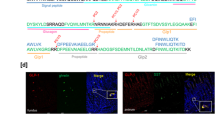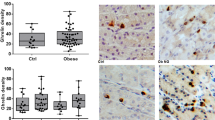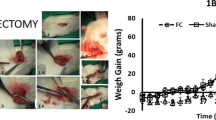Summary
Quantitative histological and immunocytochemical studies have been carried out on the endocrine cells of the gastrointestinal tract in genetically obese mice and their heterozygous (lean) litter mates.
In the ob/ob mice hyperplasia of most of the endocrine (APUD) cells of the gut was found, a condition which can be described as apudosis.
Quantitative histology of silver-stained preparations, using a method which demonstrates the majority of endocrine cells, showed a significant degree of hyperplasia in all regions of the gastrointestinal tract, with statistically significant differences in the upper intestine (p = < 0.001). Quantitative immunocytochemical studies by image analysis showed a difference in both number and hormone content of Gastric Inhibitory Peptide (GIP) (p= < 0.001) and Enteroglucagon (EG) cells in obese as compared to lean mice.
Differences in the case of Secretin (S), Gastrin (G) and Vasoactive Intestinal Peptide (VIP) cells were not great but in the obese mice both S and G cells were present in larger numbers in the lower intestine whereas in the lean, and in normal mice, they are predominant in the upper intestine.
Whether these complex gut endocrine changes are primary, or secondary to the metabolic abnormalities seen in the ob/ob mouse, cannot presently be determined.
Similar content being viewed by others
References
Bloom, S.R.: Radioimmunoassay of intestinal hormones. Gut15, 502–510 (1974)
Bottger, I., Faloona, G., Unger, R.H.: Response of islet cells and gut hormones to fat absorption: and “entero-insular axis” for fat. Abstr. Clin. Res.20, 542 (1972)
Bray, G.A., York, D. A.: Thyroid function of genetically obese rats. Endocrinology88, 1095–1099 (1971)
Brown, J.C., Dryburgh, J.R.: A gastric inhibitory polypeptide. II. The complete amino acid sequence. Canad. J. Biochem.49, 867–872 (1971)
Buffa, R., Polak, Julia M., Pearse, A.G.E., Solcia, E., Grimelius, L., Capeila, C.: Identification of the intestinal cell storing gastric inhibitory peptide. Histochemistry (in press 1975)
Capella, C., Solcia, E., Vassallo, G.: Ultrastructural and histochemical investigations on the endocrine cells of the intestinal mucosa. Proc. Third International Symposium, London 1971. p. 282–290. London: William Heinemann Medical Books 1972
Cataland, S., Crockett, S.E., Brown, J.C., Mazzaferri, E.L.: Gastric inhibitory Polypeptide (GIP) stimulation by oral glucose in man. J. clin. Endocr.39, 223–228 (1974)
Coons, A.H., Leduc, E.H., Connolly, J.M.: Studies on antibody production. I: Method for the histochemical demonstration of specific antibody and its application to a study of hyperimmune rabbit. J. exp. Med.102, 49–60 (1955)
Dupré, J., Ross, S.A., Watson, D., Brown, J.C.: Stimulation of insulin secretion by gastric inhibitory polypeptide in man. J. clin. Endocr.37, 826–828 (1973)
Edwardson, J.A., Hough, C.A.M.: The pituitary adrenal system of the genetically obese (ob/ob) mouse. J. Endocr.65, (in press 1975)
Gepts, W., Christophe, J., Mayer, J.: Pancreatic islets in mice with the obese-hyperglycaemic syndrome. Diabetes9, 63–69 (1960)
Graham, B.C., Karnovsky, M. J.: The early stages of absorption of injected horseradish peroxidase in the proximal tubules of mouse kidney: ultrastructural cytochemistry by a new technique. J. Histochem. Cytochem.14, 291–302 (1966)
Grimelius, L.: A silver nitrate stain for α2 cells in human pancreatic islets. Acta Soc. Med. upsalien.73, 243–270 (1968)
Hellerström, C., Hellman, B., Larsson, S.: Some aspects of the structure of the adrenals in obese-hyperglycaemic mice. Acta path. microbiol. scand.54, 365–372 (1962)
Hellman, B., Brolin, S.E., Hellerström, C., Hellman, K.: The distribution pattern of the pancreatic islet volume in normal and hyperglycaemic mice. Acta endocr. (Kbh.)36, 609–616 (1961)
Hellman, B., Larsson, S., Westman, S.: The metabolism of variously labelled glucose in fatty liver from mice with congenital hyperglycaemia and obesity. Acta endocr. (Kbh.)39, 457–464 (1962a)
Hellman, B., Larsson, S., Westman, S.: Acetate metabolism in isolated epididymal adipose tissue from obese-hyperglycaemic mice of different ages. Acta physiol. scand.56, 189–198 (1962b)
Hellman, B., Larsson, S., Westman, S.: Influence of glucose on thein vitro metabolism in the epididymal adipose tissue of obese-hyperglycaemic mice. Med. exp. (Basel)7, 39–44 (1962 c)
Hellman, B., Petersson, B.: The activity of the islet B cells as indicated by the nuclear and nucleolar size in the American obese-hyperglycaemic mice. Acta path. microbiol. scand.50, 291–296 (1960)
Ingalls, A.M., Dickie, M.M., Snell, G.D.: Obese, new mutation of the mouse. J. Hered.41, 317–318 (1950)
Marks, V., Samols, E.: Intestinal factors in the regulation of insulin secretion. Advances in Metabolic Disorders (R. Levine and R. Luft eds.), vol. 4, p. 1. New York: Academic Press 1970
Mayer, J.: Genetic, traumatic and environmental factors in the aetiology of obesity. Physiol. Rev.33, 472–508 (1953)
Mayer, J., Dickie, M.M., Bates, M.W., Vitale, J. J.: Free selection of nutrients by hereditary obese mice. Science113, 745–746 (1951)
Mayer, J., Jones, A.K.: Hypercholeterolaemia in the hereditary obese-hyperglycaemic syndrome of mice. Amer. J. Physiol.175, 339–342 (1953)
Mayer, J., Russell, R.E., Bates, M.W., Dickie, M.M.: Metabolic, nutritional and endocrine studies of the hereditary obesity-diabetes syndrome of mice and mechanism of its development. Metabolism2, 9–21 (1953)
Mayer, J., Yannoni, Claudine Z.: Increased intestinal absorption of glucose in three forms of obesity in the mouse. Amer. J. Physiol.185, 49–53 (1956)
Mclntyre, N., Holdsworth, C.D., Turner, D.S.: New interpretation of glucose tolerance. Lancet1964 II 20
Naesser, P.: Structure of the adrenal glands in mice with the obese-hyperglycaemic syndrome (gene symbol ob). Acta path. microbiol. scand.83A, 120–126 (1975)
Pearse, A.G.E., Polak, Julia M., Adams, C., Kendall, P.A.: Diethylpyrocarbonate, a vapour phase fixative for immunofluorescence studies on polypeptide hormones. Histochem. J.6, 347–352 (1974)
Polak, Julia M., Bloom, S.R., Coulling, I., Pearse, A. G. E.: Immunofluorescent localization of secretin in the canine duodenum. Gut12, 605–610 (1971)
Polak, Julia M., Bloom, S.R., Kuzio, M., Brown, J. C., Pearse, A. G. E.: Cellular localization of gastric inhibitory polypeptide in the duodenum and jejunum. Gut14, 284–288 (1973)
Polak, J. M., Pearse, A. G. E., Garaud, J.-C., Bloom, S.R.: Cellular localization of vasoactive intestinal peptide in the mammalian and avian gastrointestinal tract. Gut15, 720–724 (1974)
Polak, J. M., Pearse, A. G. E., Joffe, S., Bloom, S.R.: Quantification of secretin release by acid, using immunocytochemistry and radioimmunoassay. Experientia (in press 1975)
Polak, J. M., Stagg, B., Pearse, A. G. E.: Two types of Zollinger-Ellison syndrome. Immunofluorescence, cytochemical and ultrastructural studies of the antral and pancreatic gastrin cells in different clinical states. Gut13, 501–512 (1972)
Shull, K. H., Mayer, J.: Analysis of blood sugar response of obese-hyperglycaemic mice and normal mice to hormones: insulin, glucagon and epinephrine. Endocrinology58, 220–225 (1956)
Solcia, E., Pearse, A. G. E., Grube, D., Kobayashi, S., Bussolati, G., Creutzfeldt, W., Gepts, W.: Revised Wiesbaden Classification of gut endocrine cells. Rendic. Gastorenterol.5, 13–16 (1973)
Solcia, E., Polak, J. M., Buffa, R., Capella, C., Pearse, A. G. E.: Endocrine cells of the intestinal mucosa. In: Proc. International Symposium on Gastrointestinal Hormones (Ed. J. C. Thompson), 1974. Austin and London. University of Texas Press (in press), (1975)
Stauffacher, W., Lambert, A. E., Vecchio, D., Renold, A. E.: Measurements of insulin activities in pancreas and serum of mice with spontaneous (“ obese ” and “ New Zealand obese ”) and induced (gold thioglucose obesity) and hyperglycaemia with consideration on the pathogenesis of the spontaneous syndrome. Diabetologia3, 230–237 (1967)
Turner, D. S.: Intestinal factors and the control of insulin release. PhD Thesis. University of London 1972
Turner, D. S., Etheridge, Lauraine, Jones, Julie, Marks, V., Meldrum, B., Bloom, S.R., Brown, J. C.: The effect of the intestinal polypeptides, IRP and GIP, on insulin release and glucose tolerance in the baboon. Clin. Endocr.3, 489–493 (1974)
Turner, D.S., Etheridge, Lauraine, Marks, V., Brown, J.C., Mutt, V.: Effectiveness of the intestinal polypeptides, IRP, GIP, VIP, motilin on insulin release in the rat. Diabetologia10, 459–463 (1974)
Turner, D. S., Shabaan, A., Etheridge, L., Marks, V.: The effect of an intestinal polypeptide fraction on insulin release in the ratin vitro andin vivo. Endocrinology93, 1325–1328 (1973)
Unger, R.H., Ohneda, A., Valverde, L., Eisentraut, A.M., Exton, J.: Characterisation of the responses of circulating glucagon-like immunoreactivity to intraduodenal and intravenous administration of glucose. J. clin. Invest.47, 48–65 (1968)
Author information
Authors and Affiliations
Rights and permissions
About this article
Cite this article
Polak, J.M., Pearse, A.G.E., Grimelius, L. et al. Gastrointestinal apudosis in obese hyperglycaemic mice. Virchows Arch. B Cell Path. 19, 135–150 (1975). https://doi.org/10.1007/BF02889363
Received:
Issue Date:
DOI: https://doi.org/10.1007/BF02889363




